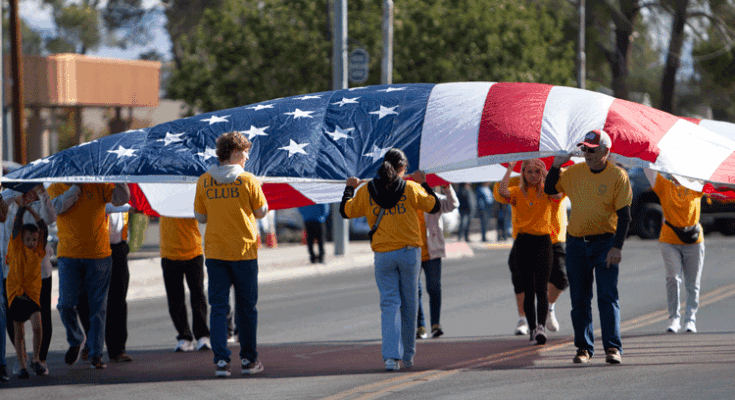Jon Johnson File Photo/Gila Herald: Members of the Safford Lions Club carry a giant flag down Main Street during a Veterans Day Parade.
Challenges Faced by Veterans Dealing with Substance Abuse
Concurrent Mental Health Conditions
Among the unique challenges veterans face, abuse often contends with occurring mental health disorders like Post Traumatic Stress Disorder (PTSD) or depression. These conditions worsen the difficulties they encounter in overcoming addiction. Treatment approaches need to encompass these health challenges for a comprehensive intervention.
Lack of Understanding
An obstacle faced by veterans struggling with substance abuse is the lack of empathy from civilians who have not undergone military experience themselves. This lack of empathy can lead to a shortage of support systems beyond the veteran community, making it more challenging for them to access treatment and encouragement on their path to recovery.
Restricted Availability of Services Tailored for Veterans
While there are plenty of options for substance abuse treatment across the country, not all programs fully meet the needs of veterans. Some successful programs focus on civilians and may overlook the struggles and experiences that veterans encounter on their path to recovery.
Ways to Address Veterans’ Specific Needs
Tailored Treatment Programs for Veterans
Creating treatment programs specifically designed for veterans has proven effective in addressing their needs. These programs have staff members with expertise in working with personnel, making it easier for veterans to connect with professionals who understand their backgrounds.
Incorporation of Evidence-Based Therapies
Integrating evidence-based therapies like Cognitive Behavioral Therapy (CBT) and Eye Movement Desensitization and Reprocessing (EMDR) can enhance outcomes for veterans dealing with substance addiction. Therapeutic methods addressing trauma symptoms and promoting changes have shown success when combined with traditional addiction treatments.
Support from Peer Groups
Peer support groups are crucial for veterans in recovery. These groups offer an environment where veterans can share experiences, learn from one another, and find the sense of camaraderie they often miss after transitioning out of the military. Veterans benefit greatly from connecting with others who have shared similar struggles, as it fosters a sense of belonging and aids in their path to healing.
Collaborative Efforts between Veterans Services and Civilian Organizations
To address the lack of understanding from civilians, it is important for veteran services and civilian organizations involved in substance abuse treatment to work together collaboratively. Educating civilians about the challenges veterans face helps dispel misconceptions, leading to increased empathy, timely intervention, and stronger support systems.
Continued Support is Crucial for Long-term Recovery Among Veterans
Aftercare Programs and Resources
Aftercare programs and resources play a role in supporting veterans after they complete their treatment. These programs offer counseling, therapy sessions, and support groups to help veterans maintain their sobriety by providing tools for managing triggers and preventing relapse.
Peer Mentoring
Peer mentoring programs are invaluable in guiding veterans toward recovery. Pairing veterans at different stages of recovery creates a mentorship dynamic that offers guidance, support, accountability, and hope. Peer mentors who have triumphed over substance addiction can provide advice tailored to the challenges faced by veterans.
Community Reintegration Support
Supporting veterans as they transition back to life after military service, especially those grappling with substance abuse, presents significant challenges. Programs offering community reintegration support play a role in aiding this process by providing help with housing, job placements, educational opportunities, and family assistance. By addressing these facets of a veteran’s life beyond treatment, the likelihood of success is greatly enhanced.
End Note
Catering to the requirements of veterans dealing with substance abuse demands an approach that recognizes their distinct hurdles while offering customized remedies. Through the creation of treatment initiatives, the incorporation of proven therapies, the encouragement of peer support networks, and the facilitation of endeavors between veteran services and civilian groups, we can ensure that our nation’s courageous individuals receive the backing they need on their journey to recovery. It is through these efforts that we pave the way for a brighter tomorrow for our veterans who are conquering substance addiction.










